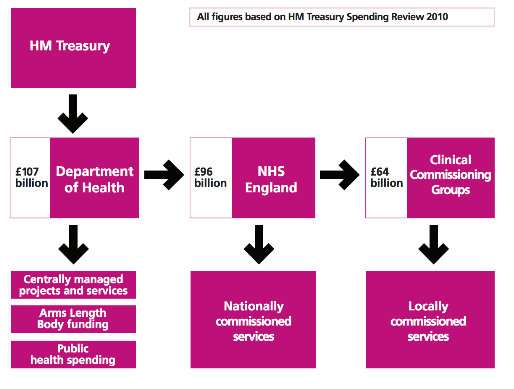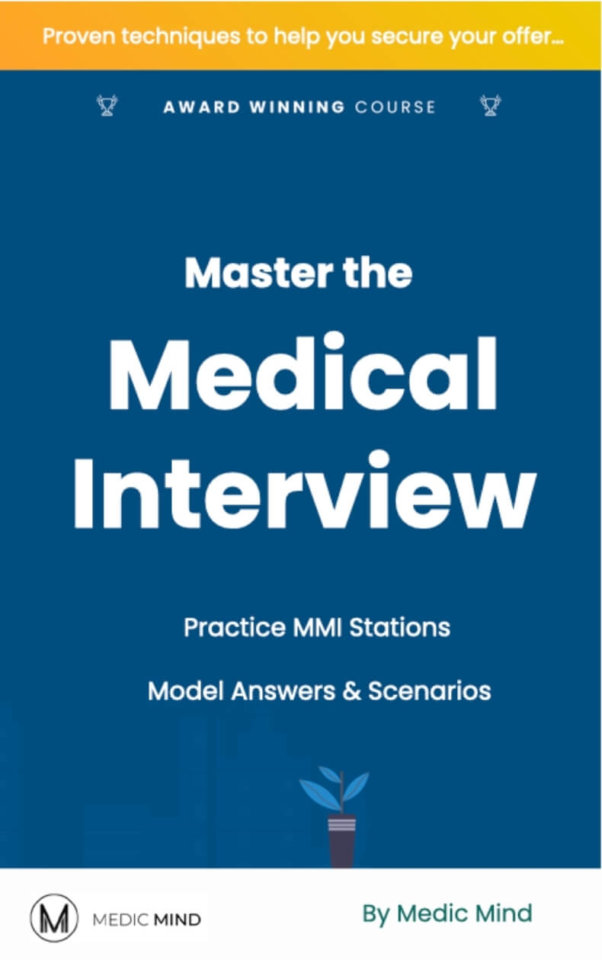Loading...

Interview Questions: NHS Structure
The NHS, or National Health Service to use it’s official name, was founded in 1948 as a free health service to all UK residents. Currently the NHS in England alone deals with over 1 million patients every 36hours. In order to run smoothly and deal with such a large volume of patients, the NHS has to have a clear structure for spending.
NHS Structure

Government Level – HM Treasury
The government decide how much money the NHS receives and also do some top-level priority setting with regards to setting healthcare targets nationwide.

Department of Health
The Department of Health is headed by the Secretary of State for Health, who at the time of writing this is Matt Hancock. The department is in charge of passing money onto several areas, with the largest ‘Lions” share going to NHS England.
NHS England
Created in 2013, NHS England is ultimately in charge of the commissioning of NHS services, as well as setting NHS Strategy. They divide their allocated monies between the Clinical Commissioning Groups (CCGs) and Nationally Commissioned Services(NCSs).
Clinical Commissioning Groups
There are 212 Clinical Commissioning Groups across England which are tasked to identify area specific requirements for healthcare. Each CCG is tasked to purchase services from a range of suppliers including but not limited to; NHS Hospitals, community services, mental health providers, ambulance providers, as well as charities and private sector service providers.
What other organizations should I be aware of?
Kickstart your Interview Prep
There are many different organisations that are used in addition to those mentioned above which heavily impact on the NHS and its running. These include NHS Improvement and the Care Quality Commission.
NHS Improvement
Responsible for overseeing NHS foundation trusts, NHS trusts and independent providers to ensure patients consistent safety and high quality of compassionate care within local health systems, with a focus on financial sustainability.
Care Quality Commission (CQC)
The independent regulator of health and social care in England, the CQC is responsible for monitoring, inspecting and regulating health and social care services. They regularly publish their findings with ratings to aid patients in choosing their care.
Sample Question and Answer:
Q: How is the NHS structured today?
A: The National Health Services structure is constantly evolving with the needs of the nation, making it complex in its structure. Broadly speaking there is a four tiered structure from government level to the Clinical Commissioning Groups.
Starting at the Government level, the NHS budget is set and passed on to the Secretary of State for Health at the Department of Health. Currently this is Matt Hancock, where he oversees the division of funding between government set top-priority projects, and NHS England, where most of the funding is sent.
NHS England, originally created in 2013, is in charge of the commissioning of all healthcare across England. This is split into Nationally Commissioned Services, as well as Clinical Commissioning Groups. There are 212 Clinical Commissioning Groups across England. They are incharge of locally sourcing and commissioning healthcare related services, such as NHS and private sector supplied hospitals, ambulance services, mental health providers and community services to name a few.
Of course there are many more organisations involved in the running of the NHS, including the CQC, who focus on regulating health and social care in England, and NHS Improvement, who are currently focusing mainly on the financial sustainability of the NHS.
In summary the NHS has quite a complex structure, but in broad terms is made up of four levels: the government, the Department of Health, NHS England and the 212 Clinical Commissioning Groups based across England.
Frequently Asked Question
→What is the NHS (National Health Service) Structure?
The NHS Structure is a complex organization that includes multiple levels of management and administration, as well as a variety of health care providers, such as hospitals, clinics, and general practitioners.
→What are the key components of the NHS Structure?
The key components of the NHS Structure include the Department of Health, NHS England, Clinical Commissioning Groups (CCGs), NHS Trusts, and healthcare providers such as hospitals and general practitioners.
→What is the role of healthcare providers in the NHS Structure?
Healthcare providers, such as hospitals and general practitioners, are responsible for delivering healthcare services to patients. They work in partnership with other parts of the NHS Structure to ensure that patients receive high-quality care.
→What are some challenges facing the NHS Structure?
Some challenges facing the NHS Structure include increasing demand for services, budget constraints, and workforce shortages. These challenges require innovative solutions and effective management to ensure that patients receive high-quality care.
→How can I prepare for an interview about the NHS Structure?
Applicants can prepare for an interview about the NHS Structure by researching the organization and its key components, understanding current healthcare issues and trends, and preparing to discuss their own knowledge and experience related to healthcare management and administration.
→What are some common interview questions about the NHS Structure?
Common interview questions about the NHS Structure may include: What do you know about the NHS Structure? What are the key challenges facing the NHS? How would you address workforce shortages in the NHS? How do you stay up to date with changes in healthcare policy and regulations? How do you prioritize competing demands in a healthcare setting?
Related
Related Articles
Related links
MMI interview preparation with our live interactive day and comprehensive feedback
Personalised 1-1 lessons, tailored to your interview preparation
Covering 8 interview topics, with model answers, live MMI analysis and hot topics





Was this article helpful?
Still got a question? Leave a comment
Leave a comment